Internet Archive
Ebooks
269 results
View More
Skip carousel
Carousel Next
Vertical Motion

Ebook
Vertical MotionbyCan Xue
Rating: 3 out of 5 stars
3/5
Remove Vertical Motion from saved
Frontier

Ebook
FrontierbyCan Xue
Rating: 2 out of 5 stars
2/5
Remove Frontier from saved
The Embroidered Shoes: Stories

Ebook
The Embroidered Shoes: StoriesbyCan Xue
Rating: 3.5 out of 5 stars
3.5/5
Remove The Embroidered Shoes: Stories from saved
Save Evil King's Favorite Consort: Volume 3 for later
Documents
84,810 results
View More
The Last Lover - Can Xue

Document
The Last Lover - Can Xue
Added by DANNY RICARDO CANO PORTILLA
0 ratings0% found this document useful
Remove The Last Lover - Can Xue from saved
Xue.pdf
=====
ck to results
See All Buying Options
Deliver to Sejin - Campbelltown 5074
As an alternative, the Kindle eBook is available now and can be read on any device with the free Kindle app.
Add to List
 Delivery to Australia?This item is available at Amazon.com.au.
Delivery to Australia?This item is available at Amazon.com.au.Buy it on Amazon.com.au

See Clubs
Not in a club? Learn more
Sponsored

Roll over image to zoom in


Read sample
Follow the Authors

CanxueCanxue
Follow

Porochista KhakpourPorochista Khakpour
Follow
Frontier Paperback – March 14, 2017
by Can Xue (Author), Karen Gernant (Translator), & 2 more
4.3 4.3 out of 5 stars 32 ratings
3.6 on Goodreads
312 ratings
See all formats and editions
Kindle
from $9.49Read with Our Free App
Paperback
from $7.99
9 Used from $12.657 New from $7.99
New Novel from the Winner of the 2015 Best Translated Book Award
Introduction by Porochista Khakpour.
"One of the most raved-about works of translated fiction this year"―Jonathan Sturgeon, Flavorwire
Frontier opens with the story of Liujin, a young woman heading out on her own to create her own life in Pebble Town, a somewhat surreal place at the base of Snow Mountain where wolves roam the streets and certain enlightened individuals can see and enter a paradisiacal garden.
Exploring life in this city (or in the frontier) through the viewpoint of a dozen different characters, some simple, some profound, Can Xue's latest novel attempts to unify the grand opposites of life--barbarism and civilization, the spiritual and the material, the mundane and the sublime, beauty and death, Eastern and Western cultures.
A layered, multifaceted masterpiece from the 2015 winner of the Best Translated Book Award, Frontier exemplifies John Darnielle's statement that Can Xue's books read "as if dreams had invaded the physical world."
Can Xue is a pseudonym meaning "dirty snow, leftover snow." She learned English on her own and has written books on Borges, Shakespeare, and Dante. Her publications in English include The Embroidered Shoes, Five Spice Street, Vertical Motion, and The Last Lover, which won the 2015 Best Translated Book Award for Fiction.
Karen Gernant is a professor emerita of Chinese history at Southern Oregon University. She translates in collaboration with Chen Zeping.
Chen Zeping is a professor of Chinese linguistics at Fujian Teachers' University, and has collaborated with Karen Gernant on more than ten translations.
Porochista Khakpour is the author of two novels, Sons and Other Flammable Objects and The Last Illusion.
Read less
Report incorrect product information.
Print length
470 pages
Language
English
Next page
Customers who viewed this item also viewed
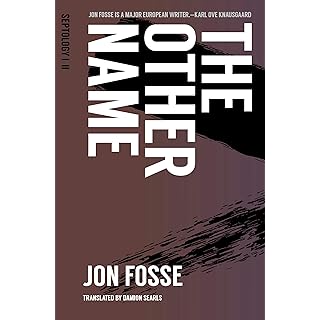
The Other Name: Septology I-II (Septology, 1)
Jon Fosse
4.5 out of 5 stars 112
Paperback
20 offers from $7.29
Customers who bought this item also bought
Page 1 of 9Page 1 of 9
Previous page
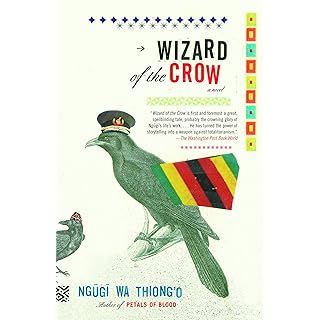
Wizard of the Crow
Ngugi wa Thiong'o
4.5 out of 5 stars 285
Paperback
55 offers from $3.54
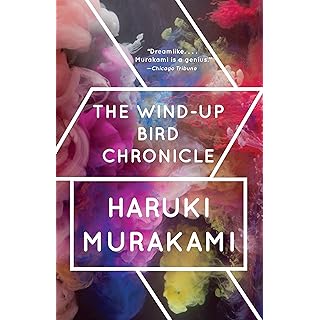
The Wind-Up Bird Chronicle: A Novel
Haruki Murakami
4.4 out of 5 stars 9,665
Paperback
115 offers from $3.49

The Wolves of Eternity: A Novel
Karl Ove Knausgaard
4.3 out of 5 stars 5
Hardcover
43 offers from $24.26

Killing Commendatore: A novel
Haruki Murakami
4.4 out of 5 stars 7,869
Paperback
68 offers from $3.02
Next page
Editorial Reviews
Review
". . . [Can Xue] is China's premier writer of the avant-garde, an experimental trickster. . ."―Porochista Khakpour
"There's a new world master among us, and her name is Can Xue."―Robert Coover
"If China has one possibility of a Nobel laureate, it is Can Xue."―Susan Sontag
"Odd, atmospheric, and enchanting: a story in which, disbelief duly suspended, one savors improbabilities along with haunting images and is left wanting more."―Kirkus Reviews (Starred Review)
"At the sentence level, [Frontier] is a wonderful, carefully hewn thing, lucid and pure."―Amanda DeMarco, Los Angeles Review of Books
"This ambitious book aspires to refashion the Chinese language to explore interiority and subjectivity, establish transnational authorship, and enter the conversation of world literature."―Yun Ni, Harvard Review Online
About the Author
Can Xue is a pseudonym meaning "dirty snow, leftover snow." She learned English on her own and has written books on Borges, Shakespeare, and Dante. Her publications in English include, The Embroidered Shoes, Five Spice Street, Vertical Motion, and The Last Lover, which won the 2015 Best Translated Book Award for Fiction.
Karen Gernant is a professor emerita of Chinese history at Southern Oregon University. She translates in collaboration with Chen Zeping.
Chen Zeping is a professor of Chinese linguistics at Fujian Teachers' University, and has collaborated with Karen Gernant on more than ten translations.
Porochista Khakpour is the author of two novels, Sons and Other Flammable Objects and The Last Illusion.
Excerpt. © Reprinted by permission. All rights reserved.
FrontierBy Can Xue, Karen Gernant, Chen Zeping
OPEN LETTERCopyright © 2008 Can Xue
All rights reserved.
ISBN: 978-1-940953-54-0
ContentsIntroduction, vii,
Note on Names, xvii,
Chapter 1: Liujin, 3,
Chapter 2: José and Nancy, 33,
Chapter 3: Qiming, 61,
Chapter 4: Sherman, 88,
Chapter 5: The Baby, 116,
Chapter 6: Liujin and Amy, 143,
Chapter 7: Lee and Grace, 165,
Chapter 8: Liujin, Her Parents, and the Black Man, 191,
Chapter 9: Little Leaf and Marco, 219,
Chapter 10: The Director and Nancy, 243,
Chapter 11: Liujin and Amy, as well as Qiming, 267,
Chapter 12: Liujin and Roy, as well as a Headless Man, 290,
Chapter 13: Qiming and Liujin, 309,
Chapter 14: Liujin and Ying, 328,
Chapter 15: Snow, 342,
CHAPTER 1
LIUJIN
It was late. Liujin stood there, leaning against the wooden door. The ripe grapes hanging on the arbors flickered with a slight fluorescence in the moonlight. Blowing in the wind, the leaves of the old poplar tree sounded lovely. The voice of someone talking blended with the rustling of the poplar leaves. Liujin couldn't hear what he was saying. She knew it was the man who had recently been coming here late every night and sitting on the stone bench near the courtyard gate. At first, this had frightened Liujin and she hadn't dared to go outside. Time after time, she had peeped out the window. Later on, realizing that this bear-like old man was harmless, she worked up the courage to approach him. He had good eyesight: even in the dim light, his eyes were as penetrating as sharp glass. He was busying his hands twisting hemp. He didn't like to talk with people; his answers to Liujin's questions were always vague: "I'm not sure ..." He wasn't one of her neighbors; where did he come from? Although he didn't talk with her, he seemed to enjoy talking to himself. His words kept time with the sound of the wind and the leaves. When the wind stopped, he stopped. This was really strange. Tonight, his voice was louder, and pricking up her ears, Liujin made out a few words: "At noon, in the market ..." Liujin tried hard to imagine the scene in this indoor market: piece goods, gold and silver jewelry, raisins, tambourines, foreigners, and so on. But she had no clue what the old man meant. Even though it was late, a woman was actually singing piteously and plaintively on the other side of the street; the woman seemed to be young. Could she be singing for the old man? But he apparently wasn't listening; he was talking to himself. These days, Liujin had grown accustomed to his voice. She thought the old man looked a little like the poplar tree in the courtyard. The poplar was old, and so this man must be old, too. Liujin asked: Are you twisting the hemp to sell it? He didn't answer. Sleepy, Liujin went off to bed. Before she fell asleep, she heard the young woman's song turn sad and shrill. When she arose in the morning, she saw that the old man had left without a trace — not even a bit of hemp had been dropped on the ground. He really was a strange person. When she inquired of the neighbors, they said they didn't know of such a person. No one had seen him. This made sense, for people generally didn't go out so late. Liujin knew that she went to bed later than anyone else in the little town: she had formed this habit a long time ago. Still, what about the young woman singing? Judging by the direction the voice came from, she seemed to be from Meng Yu's family. That family bought sheep from the pastures, slaughtered them in the market, and sold the fresh meat. With the strange old man showing up in her yard, Liujin no longer felt desolate and lonely in the autumn nights. She felt a vague affection for him, but she preferred not to explore the nature of this emotion.
She had lived by herself in this small enclosed area for five years. Before she was born, her parents had moved here from a large industrial city in the interior. Five years ago, her elderly parents went back to their hometown with many others, but she didn't. Why had she stayed? Why hadn't she wanted to go to the big city? She had some impressions of the city from her father's descriptions of it. These impressions were mostly misty, not very reliable; she had tried hard to synthesize them, but without success. And so when her parents packed their bags and prepared to leave this small frontier town to go back to their old home, she began to feel dizzy. She was even unsteady when she walked. Late at night, for several days before they left, she heard the cracking sound at the riverside: with her bizarre sense of hearing, she knew the sound came from the poplars. These explosions came at intervals until the wee hours. In response to this inauspicious sound, a vague notion gradually occurred to Liujin. When she suggested that she stay behind, her father merely raised his right eyebrow. This was the way he expressed himself whenever something confirmed what he thought. "You're an adult. It's your choice." All of a sudden, Liujin realized that he and Mama had been waiting for her to suggest this: she really was an idiot. So she unpacked her suitcase and put everything back where it belonged. True, she was thirty years old: why did she have to live with her parents? When the train started, her parents didn't lean out the window. She didn't know what they were thinking about. But when the last car was about to vanish from view, she suddenly saw clearly the big city in the distance. To be precise, it wasn't a city, but a large white cloud floating in midair, with mirages in the mist. She even saw the apartment in the tall building where her parents lived. She didn't know why their window was so dark in the strong light. How had she recognized it? Because her mother's old-style pleated skirt was hanging in front of the window. On her way back, she walked steadily. She was returning to the home that now belonged to her alone. She trembled a little in excitement.
At first, Liujin wasn't used to living alone. She sold cloth at the market. Every day when she left the noisy market and returned to the isolated little house, it was dark. For several days in a row, a tiny white wagtail strode hurriedly into her house; the little thing cried out briefly and sharply, as if looking for its companion. After quickly patrolling around inside, it left with a despondent cry. Liujin heard it fly to a tree, where it continued chirping. Had it experienced some tragedy in its life? Sitting under the lamp, she thought about the man who had recently been coming often to the market. He wore glasses, and when he picked up the cloth to look at it, his glasses almost touched the material. Liujin found this amusing. He seemed out of place in the market. He wasn't like the other shoppers, and he didn't bring any shopping bags, either. He was dressed like a farmer from the frontier. Of course he wasn't a farmer; one could see that from the expression in his eyes. He always looked at cloth, but never bought any. Nor did he glance at Liujin. The way he touched the homemade cloth brought about an almost physiological response in Liujin. What kind of person was he? "I'm just looking," he said, as if imploring Liujin. "Go ahead and look as long as you like," she replied stiffly. All of a sudden — she didn't know why — she felt empty inside.
One day, although it was late, the white wagtail hadn't returned to its nest. It was circling beside a thorny rose bush, singing sadly. Acting on a hunch that something had happened, Liujin walked into the courtyard. She saw the bespectacled man from the market talking with a young woman under the streetlight. Suddenly, the woman screamed and ran away. Looking dizzy, the man leaned against a power pole, closed his eyes, and rested. The wagtail sang even more sadly, as if it were a mother who had lost her daughter. Approaching the man, Liujin said softly, "Tomorrow, I'll take out a few more bolts of new cloth with a snow lotus pattern. It's like ... snow lotus, and yet it isn't." When the man heard her talking to him, he relaxed a little and said "Hello." He turned and looked at her courtyard. Just then, she noticed that the wagtail had disappeared. Without saying anything else, the man left. The way he walked was funny — a little like a horse. Liujin had heard others call him "Mr. Sherman." Maybe her encounters with him at the market weren't accidental. Otherwise, why had he appeared in front of her house today? She also remembered the way the young woman had stamped her feet impatiently; at that time, the wagtail was chirping non-stop. Later, Liujin ran into this man in front of her house several times and greeted him properly, calling him "Mr. Sherman." He always stood there — a little as if he were waiting for someone, for he kept looking at his watch. Liujin wondered if he was waiting for the young woman. Why had he chosen this place? How strange.
With Mr. Sherman showing up, Liujin had more energy. She worked hard tending her garden. Whenever she had a day off, she went into full swing. She planted many chrysanthemums and salvia along the wall — near the thorny rose bushes that were already there. There were still two poplars, one in the front and one in the back of the courtyard. Now she planted a few sandthorn trees: she liked plain trees like this. She also fertilized the grapes. On one of her days off, Mr. Sherman entered her courtyard. Liujin invited him to sit under the grape arbor. She brought out a tea table and placed a tea set on it. Just as they were about to drink tea, the wagtail appeared. It walked quickly back and forth, its tail jumping with each step. It kept chirping. Mr. Sherman paled and craned his neck like a horse and looked out. Finally, without drinking his tea, he apologized and took his leave. Liujin was very puzzled. It was this bird — perhaps it was two or three birds, all of them alike — that particularly puzzled her. Liujin realized she hadn't seen the young woman again. What was going on between her and Mr. Sherman? Just now as he was sitting here, she had noticed that his right index finger was hurt and was wrapped in a thick bandage. He was dexterous in picking up his teacup with his left hand. Maybe he was left-handed.
By and large, Liujin's life consisted of going from her home to the market and from the market to her home. On an impulse one night, she walked out and took the street to the riverside. The water level was low, and the small river would soon dry up. The sky was high. She walked along the river in the moonlight. There, she saw the corpses of poplars. She didn't know if the four or five poplars had died of old age or if they had died unexpectedly. Their tall, straight trunks were ghostly. At first sight, her heart beat quickly. It was hard to muster the nerve to walk over to them. She startled a few willow warblers: their sharp cries made her legs quiver. She turned around and left, walking until she was sweating all over; then finally she looked back. How could the dead poplar trees still be right before her? A shadow emerged from the poplar grove and said, "Ah, are you here, too?" The sound startled her and almost made her faint. Luckily, she recognized her neighbor's voice. The neighbor wasn't alone. Behind him was another shadow. It was Mr. Sherman, and he was laughing. As he approached, Mr. Sherman said to Liujin, "When one sees dead trees like this, one shouldn't run away. If you do, they'll chase right after you." The neighbor chimed in, "Mr. Sherman's telling the truth, Liujin. You haven't experienced this before, have you?" Even though she was standing in the shadows, Liujin felt her face turn fiery red. Had these two been hiding here long? How had she happened to come here just now? She recalled sitting at the table earlier writing her mother a letter, and being unable to go on writing because her mother's words kept reverberating in her ears: "... Liujin, Liujin. There's no way for you to come back to us. You'd better take good care of yourself." Did Mama want her back after so long? She stood up and listened closely for a while to the wagtail's lonely singing in the courtyard. When she had rushed out the gate, she forgot to close it. Perhaps these two men came here often to study these dead trees, but it was the first time she had ever come here.
"Look, the others are flourishing. It's only these few trees: Did they commit collective suicide?"
When Mr. Sherman spoke again, his glasses were flashing with light. Liujin looked over at the trees and saw the moon brighten. The other poplars were so beautiful and vivacious that they seemed on the verge of speaking. Only the few dead ones were spooky. Her neighbor, old Song Feiyuan, rammed a shovel against a dead poplar trunk. Liujin noticed that the tree trunk remained absolutely still. Old Song chucked the shovel away and stood dazed in front of the trunk. Mr. Sherman laughed a little drily. Liujin suddenly recalled how wild this neighbor was when he was home. That autumn, this old man had gone crazy and dismantled the rear wall of his house. Luckily, the roof was covered with light couch grass, so the house didn't collapse. In the winter, he warded off the cold north wind with oilcloth.
"Brother Feiyuan, what are you doing? These trees are dead," Liujin tried to calm him down. A sound came from the river, as if a large fish had jumped up out of the water.
Liujin was three meters away from the men as she spoke to them. She wanted to get a little closer, but whenever she took a step, they backed up. When she straightened again after bending down to free a grain of sand from her shoe, they had disappeared into the woods. A gust of wind blew over her, and Liujin felt afraid. She turned around to leave, but bumped into a dead tree. After taking a few steps around the dead tree, she bumped into another one. She saw stars and shouted "Ouch!" She looked up and saw that the dead tree trunks, standing close together, were like a wall bending around her and enclosing her. Apart from the sky above, she could see only the dark wall of trees. Frustrated, she sat down on the ground, feeling that the end of the world was approaching. It was really absurd: How had she come here? Fish were still jumping in the little river, but the sound of the water was far away. She buried her head in her hands. She didn't want to see the tree trunks. She thought it might be her neighbor Song Feiyuan playing tricks. This had to be an illusion, yet how had he and Mr. Sherman caused her to produce such an illusion? She strained to consider this question, but she was too anxious and couldn't reach a conclusion. Suddenly aware of a strong light, she moved her hands and saw lightning — one bolt after another lit up her surroundings until they shone snow-bright. The dead trees that had closed up around her had now retreated far into the distance. The branches danced solemnly and wildly in the lightning. She stood up and ran home without stopping.
Recalling these events, Liujin felt it was quite natural that the old man had come to her small courtyard. Perhaps it was time for — for what? She wasn't sure; she only felt vaguely that it had something to do with her parents who were far away. She remembered that the year before he left, her father had also twisted hemp. In the winter, he had sat on the bare courtyard wall: he had watched the activity on the street while twisting hemp. Not many people were on the road then, and there were even fewer vehicles. Father twisted the hemp unhurriedly, and — a hint of a smile floating on his face — gazed at the people passing by. "Dad, do you see someone you know?" Liujin asked. "Ah, no one is a stranger. This is a small town." Liujin thought to herself, Since every person was familiar, then Father must be taking note of something. What was it? Liujin walked into the courtyard and went over to the wall where her father had often sat. Just then, she heard the sorrowful singing of a bird. The bird was in a nearby nest; perhaps it had lost its children, or perhaps it was hurt, or perhaps nothing had happened. Or was it a pessimist by nature? From its voice, she could tell that the bird was no longer young. Maybe, back then, Father had sat here in order to listen to it. This seemed to be the only spot where one could hear it. What kind of bird was it? She guessed that the nest was built in the poplar tree in back, but when she walked a few steps away, she couldn't hear the bird. When she returned to her original spot, she could hear it again. If Father had made a companion of it in the winter, it must be a local bird. Could it be an injured goose? If a wild goose had been injured, how could it build a nest in a poplar tree? It did sound a little like a goose. Geese flying south sometimes sounded like this. Whenever Liujin heard geese at night, she couldn't hold back her tears. It was clearly a cry of freedom, but it sounded to her like the dread that precedes execution. "The sound is directional. You can't hear it unless you're in just the right place," the old man addressed her suddenly and quite distinctly. The hemp in his hands gave off soft silver-white light. "Where did you come from?" Liujin walked over to him. He lowered his head and mumbled, "I can't remember ... Look, I am ..." He broke off. Liujin thought, What kind of person has no memory? Is there a category of people like this? He is ... who is he? She wanted to move closer to him, but she felt something pull at her right foot and nearly fell down. She was greatly surprised. After regaining her balance, she thought she would try once more — but this time with her left foot. She staggered and ended up sitting on the ground. The old man sat there twisting hemp, as if he hadn't noticed. Liujin heard herself shout at him angrily, "Who are you?!"
(Continues...)Excerpted fromFrontierbyCan Xue, Karen Gernant, Chen Zeping. Copyright © 2008 Can Xue. Excerpted by permission of OPEN LETTER.
All rights reserved. No part of this excerpt may be reproduced or reprinted without permission in writing from the publisher.
Excerpts are provided by Dial-A-Book Inc. solely for the personal use of visitors to this web site.
Read less
Product details
Publisher : Open Letter; First Edition (March 14, 2017)
Language : English
Paperback : 470 pages
ISBN-10 : 1940953545
ISBN-13 : 978-1940953540
Item Weight : 1.1 pounds
Dimensions : 5.5 x 0.75 x 8.5 inchesBest Sellers Rank: #26,349 in Books (See Top 100 in Books)#121 in Cultural Heritage Fiction
#1,173 in Contemporary Women Fiction
#1,771 in Literary Fiction (Books)Customer Reviews:
4.3 4.3 out of 5 stars 32 ratings
Important information
To report an issue with this product, click here.
About the authors
Follow authors to get new release updates, plus improved recommendations.

Follow
Canxue
Discover more of the author’s books, see similar authors, read author blogs and more
See more on the author's page

Follow
Porochista Khakpour
Discover more of the author’s books, see similar authors, read author blogs and more
See more on the author's page
Sponsored

How would you rate your experience shopping for books on Amazon today?
Very poor
Neutral
Great
Customer reviews
4.3 out of 5 stars
4.3 out of 5
32 global ratings
5 star 58%
4 star 19%
3 star 18%
2 star 4%
1 star
0%
How customer reviews and ratings work
Review this product
Share your thoughts with other customers
Write a customer review
Sponsored
Reviews with images
See all photos

Top reviews
Top reviews from the United States
Marg
4.0 out of 5 stars Odd BookReviewed in the United States on May 9, 2023
Verified Purchase
I have never done acid, but I would imagine reading this book is like doing acid. The story was odd and all over the place.. I have never read anything like it. Would I read a book like this again? Probably not. But always good to experience something new!
HelpfulReport
William J. Feuer
4.0 out of 5 stars People and placeReviewed in the United States on December 30, 2017
Verified Purchase
The events in this book occur (almost entirely) in Pebble Town on the frontier at the base of Snow Mountain over the course of (apparently) several decades, not in chronological order. We can judge this by the birth and aging of Liujin, the character I found most compelling. My paperback edition is 361 pages long and made up of 15 chapters, each one (more or less) devoted to a small number of people and their interactions with others and with the fabric of wherever they happen to be at that time. The translators, with the author's blessing, gave a number of these characters Western names, which helped me keep better track of them (Thank you translators!) In addition to the mountain and the town, there are snow leopards, frogs, snakes, many many birds, a mysterious poplar grove, The Design Institute, a tropical garden hanging in the air. Related places, roughly a day's travel away, are labelled Africa, Holland, the Gobi Dessert. Liujin takes two trips to the Gobi and stays in the Peculiar Hostel, once as a child with her father and once with her friend Roy (who I think she hoped would become her lover, but that apparently did not happen).
Any given chapter will begin with and include seemingly ordinary paragraphs, that could well develop a particular narrative, only they don't especially. Many of them suddenly charge off in a different direction from where they seemed to start and a character will ask him/herself a question that would certainly not have occurred to this reader to aks. Here is (a portion of) one I just found at random:
"Sherman placed the roasted mutton kebabs on a plate and carried them out to the customers. The sailor was waving away something with his hands. Sherman thought he was driving away fingerlings. Had they blocked his line of vision? Or was his mother in the dark corner across the way?..." (it continues)
Why would we keep reading this? For the first chapter or two, I was drawn in by the fantastical setting and assumed that sooner or later the pieces would start to fit together (like the structure emerging from a Bartok string quartet). But that didn't happen often and those that did fit together did not do so comfortably. So, if we're going to push through this, I guess it's because we care about Sherman and Liujin and Ying and Qiming and The Director and all.
With most books the ending makes a certain kind of sense. I am not sure I quite understand why this one stopped in the middle of the 361st page. Liujin has formed a powerful intimate bond with Amy, a younger woman. Amy, it seems, has become lost on the Snow Mountain (in a crevasse?) and Liujin, I gather, is going to seek out Amy (in the crevasse). I was reminded of the ending of EB White's Stuart Little, when Stuart in his little car turns (north?) in search of his beloved friend Margalo. EB White ensures us that Stuart felt he was headed in the right direction. Can Xue offers us no such reassurance with respect to Liujin but we are told that "Liujin strode decisively toward the opening."
5 people found this helpful
HelpfulReport
Amazon Customer
5.0 out of 5 stars A surreal classic.Reviewed in the United States on January 16, 2020
Verified Purchase
One of the best books I have read. Frontier is not a conventional novel and that works in its favor though it increases the difficulty level for readers expecting a linear story.
For fans of Coover, Delillo and Kafka this is a must read novel that offers an Eastern perspective sorely lacking in many Western focused readers.
This isn't a quick airport page turner to be consumed as a college student drowns his procrastination in cheap keg beer on a Sunday night. Rather this novel should be sipped as 25 year single malt Scotch should be savored, every sentence offering the reader a glimpse into a world of mysterious symbolism that might not symbolism but merely coincidence.

HelpfulReport
Brookshaw
4.0 out of 5 stars Not an easy book to readReviewed in the United States on June 1, 2017
Verified Purchase
Not an easy book to read, but it is well written and entertaining. While the author is described as a "trickster" or illusionist" I found that real life intruded more often as not into this dreammaker book. It is a treat to read a book from another culture, though, and Can Xue is quite brilliant.
2 people found this helpful
HelpfulReport
The Cloud
5.0 out of 5 stars I hold an MA in English and have read hundreds of novels--as good as or better than Woman WarriorReviewed in the United States on September 16, 2017
Verified Purchase
Ever wonder what literature is? Read this book. I hold an MA in English and have read hundreds of novels--as good as or better than Woman Warrior. I highly recommend the title for beauty, power, and strength of translation. Xue is a genius.
2 people found this helpful
HelpfulReport
Bradley Tangonan
5.0 out of 5 stars This book is unlike anything I've ever read. It's ...Reviewed in the United States on August 29, 2017
Verified Purchase
This book is unlike anything I've ever read. It's a ghostly, nonlinear amble through a challenging magical world, the structure and logic of which are constantly just beyond one's grasp.
2 people found this helpful
HelpfulReport
E. RODRIGUEZ-GUERRA GLEZ
5.0 out of 5 stars Five StarsReviewed in the United States on December 7, 2017
Verified Purchase
Thank you!
HelpfulReport
===
Back to results
See All Buying Options
Deliver to Sejin - Campbelltown 5074
As an alternative, the Kindle eBook is available now and can be read on any device with the free Kindle app.
Add to List
 Delivery to Australia?This item is available at Amazon.com.au.
Delivery to Australia?This item is available at Amazon.com.au.Buy it on Amazon.com.au

See Clubs
Not in a club? Learn more
Sponsored

Roll over image to zoom in


Read sample
Follow the Author

CanxueCanxue
Follow
Vertical Motion Paperback – September 13, 2011
by Can Xue (Author), Karen Gernant (Translator), & 1 more
4.1 4.1 out of 5 stars 18 ratings
3.6 on Goodreads
245 ratings
See all formats and editions
Kindle
from $9.92Read with Our Free App
Paperback
from $4.73
8 Used from $4.7310 New from $11.63
"There's a new world master among us, and her name is Can Xue."—Robert Coover
Two young girls sneak onto the grounds of a hospital, where they find a disturbing moment of silence in a rose garden. A couple grows a plant that blooms underground, invisibly, to their long-time neighbor's consternation. A cat worries about its sleepwalking owner, who receives a mysterious visitor while he's asleep. After a ten-year absence, a young man visits his uncle, on the twenty-fourth floor of a high-rise that is floating in the air, while his ugly cousin hesitates on the stairs . . .
Can Xue is a master of the dreamscape, crafting stories that inhabit the space where fantasy and reality, time and timelessness, the quotidian and the extraordinary, meet. The stories in this striking and lyrical new collection—populated by old married couples, children, cats, and nosy neighbors, the entire menagerie of the everyday—reaffirm Can Xue's reputation as one of the most innovative Chinese writers in a generation.
Can Xue is a pseudonym meaning "dirty snow, leftover snow." She learned English on her own and has written books on Borges, Shakespeare, and Dante. Her publications in English include, The Embroidered Shoes, Five Spice Street, and Blue Light in the Sky, among others.
Karen Gernant is a professor emerita of Chinese history at Southern Oregon University. She translates in collaboration with Chen Zeping.
Chen Zeping is a professor of Chinese linguistics at Fujian Teachers' University, and has collaborated with Karen Gernant on more than ten translations.
Read less
Report incorrect product information.
Print length
186 pages
Language
===
Customers who viewed this item also viewed

The Other Name: Septology I-II (Septology, 1)
Jon Fosse
4.5 out of 5 stars 112
Paperback
20 offers from $7.29
Customers who bought this item also bought
Page 1 of 5Page 1 of 5
Previous page
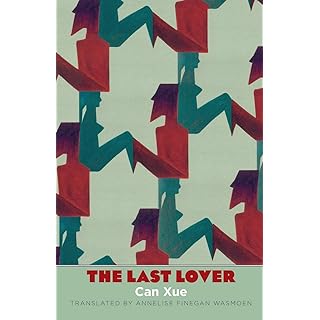
The Last Lover (The Margellos World Republic of Letters)
Can Xue
3.5 out of 5 stars 13
Paperback
35 offers from $5.16
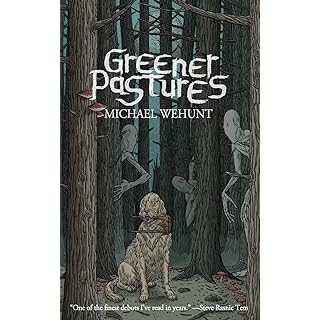
Greener Pastures
Michael Wehunt
4.2 out of 5 stars 348
Paperback
19 offers from $8.00

The Emissary
Yoko Tawada
3.9 out of 5 stars 292
Paperback
$14.93$14.93

The Diving Pool: Three Novellas
Yoko Ogawa
4.2 out of 5 stars 436
Paperback
75 offers from $2.68
Next page
Editorial Reviews
Review
"If China has one possibility of a Nobel laureate, it is Can Xue."—Susan Sontag
"There's a common thread between Can Xue and Japanese writer Haruki Murakami in that both writers use the surreal to expound the oddness of human experiences; but where Murakami's is a kind of hipster existentialism, Can Xue roots her existentialism in folklore. In many ways, Can Xue's place is between Isaac Bashevis Singer and Franz Kafka."—World Literature Today
"At her best, Xue captures the wonder of the natural world and then, with great assurance, steps beyond into something entirely."—Publishers Weekly
"Xue's creativity with descriptive language is as innovative as that of the American writers Ray Bradbury and John Steinbeck; her experiments with synesthesia result in strikingly detailed backgrounds for her insubstantial plots."—The Harvard Crimson
"Can Xue's stories unfold with an eerie, dreamlike intensity. The ingenuity of her uncanny vision calls to mind a mix of Jorge Luis Borges and George Mac Donald. But her most striking accomplishment is the way she brings her characters to life. Despite.the bizarre situations in which they find themselves, the narrators of these stories are utterly identifiable, imbued with an endearing pathos."—Baltimore Sun
About the Author
Can Xue is a pseudonym meaning "dirty snow, leftover snow." She learned English on her own and has written books on Borges, Shakespeare, and Dante. Her publications in English include, The Embroidered Shoes, Five Spice Street, and Blue Light in the Sky, among others.
Karen Gernant is a professor emerita of Chinese history at Southern Oregon University. She translates in collaboration with Chen Zeping.
Chen Zeping is a professor of Chinese linguistics at Fujian Teachers' University, and has collaborated with Karen Gernant on more than ten translations.
Product details
Publisher : Open Letter; First Edition (September 13, 2011)
Language : English
Paperback : 186 pages
ISBN-10 : 1934824372
ISBN-13 : 978-1934824375
Item Weight : 9.9 ounces
Dimensions : 5.25 x 0.5 x 8.25 inchesBest Sellers Rank: #58,494 in Books (See Top 100 in Books)#1,082 in Short Stories (Books)Customer Reviews:
4.1 4.1 out of 5 stars 18 ratings
Important information
To report an issue with this product, click here.
About the author
Follow authors to get new release updates, plus improved recommendations.

Follow
Canxue
Discover more of the author’s books, see similar authors, read author blogs and more
Related products with free delivery on eligible orders
Sponsored | Try Prime for unlimited fast, free shipping

The Viy
Nikolai Gogol
59
Paperback
$16.99

This Is My Word, Alpha and Omega: The Christ-Revelation, Which True Christians the ...
Gabriele / Gabriele Publishing House
Hardcover
$24.90

The Secret Glory
Arthur Machen
12
Paperback
$19.99
Sponsored

How would you rate your experience shopping for books on Amazon today?
Very poor
Neutral
Great
Customer reviews
4.1 out of 5 stars
4.1 out of 5
18 global ratings
5 star 50%
4 star 28%
3 star 8%
2 star 14%
1 star
0%
How customer reviews and ratings work
Review this product
Share your thoughts with other customers
Write a customer review
Sponsored
Top reviews
Top reviews from the United States
Active Runner
5.0 out of 5 stars One of my favorite living authorsReviewed in the United States on May 24, 2019
Verified Purchase
I enjoy these stories so much I teach them. I do think it's important that before you read this book you brush up a touch on the nationalist and communist tensions in China, the Cultural/Proletariat Revolution, as well as the cult of Mao and the Red Guard. In these stories, often you are only given motifs to derive from meaning from, so if you have a context in mind, it really helps you to understand the social commentary.
One person found this helpful
HelpfulReport
kenbb99
2.0 out of 5 stars Requires a lot of imagination to believe this book means anythingReviewed in the United States on May 8, 2021
Verified Purchase
My daughter read this for school and very much did not like it. I read it and didn't like it. I expect some will say that we should have to use our imaginations to fully realize a book, but a book could be entirely composed of blank pages and be just slightly less (or more) worth reading than this.
HelpfulReport
William R. Shadbolt
5.0 out of 5 stars Five StarsReviewed in the United States on April 27, 2016
Verified Purchase
Not for everyone, but for those who like surrealism, it doesn't get much better than Can Xue and her stories.
One person found this helpful
HelpfulReport
A
4.0 out of 5 stars For fans of surrealism and puzzlesReviewed in the United States on November 11, 2018
If you liked figuring out all the hidden connections in Dubravka Ugresic’s Fox, this is for you.
Much more accessible than her longer work.
The title story alone is worth the price of the collection.
HelpfulReport
See more reviews
===
Back to results
See All Buying Options
Deliver to Sejin - Campbelltown 5074
As an alternative, the Kindle eBook is available now and can be read on any device with the free Kindle app. Want to listen? Try Audible.
Add to List

See Clubs
Not in a club? Learn more
Sponsored

Roll over image to zoom in
Read sample
 Audible sample
Audible sampleLove in the New Millennium (The Margellos World Republic of Letters) Hardcover – November 20, 2018
by Can Xue (Author), & 2 more
4.0 4.0 out of 5 stars 25 ratings
3.2 on Goodreads
310 ratings
Part of: The Margellos World Republic of Letters (110 books)
The most ambitious work of fiction by a writer widely considered the most important novelist working in China today
“In this dreamlike novel . . . amid increasingly bizarre scenarios, appearances give way to hidden, otherworldly layers.”—New Yorker
In this darkly comic novel, a group of women inhabits a world of constant surveillance, where informants lurk in the flower beds and false reports fly. Conspiracies abound in a community that normalizes paranoia and suspicion. Some try to flee—whether to a mysterious gambling bordello or to ancestral homes that can be reached only underground through muddy caves, sewers, and tunnels. Others seek out the refuge of Nest County, where traditional Chinese herbal medicines can reshape or psychologically transport the self. Each life is circumscribed by buried secrets and transcendent delusions.
Can Xue’s masterful love stories for the new millennium trace love’s many guises—satirical, tragic, transient, lasting, nebulous, and fulfilling—against a kaleidoscopic backdrop of commerce and industry, fraud and exploitation, and sex and romance drawn from the East and the West.
Read less
Report incorrect product information.
Part of series
The Margellos World Republic of Letters
Print length
288 pages
Next page
Customers who viewed this item also viewed

The Other Name: Septology I-II (Septology, 1)
Jon Fosse
4.5 out of 5 stars 112
Paperback
20 offers from $7.29
Editorial Reviews
Review
“In this dreamlike novel . . . amid increasingly bizarre scenarios, appearances give way to hidden, otherworldly layers.”—New Yorker
“Ambitious . . . masterful. . . . Can Xue’s superb experimental novel is sure to keep readers hooked.”—Emily Park, Booklist
“A solo dance in the dark, a metaphysical picture of secular life that operates on its own elusive emotional logic . . . the book takes place in a dreamscape . . . like looking deeply into a painting—Dali’s playful surprises bathed in Munch’s crepuscular light.”—Kevin Wang, Columbia Journal
“Translator Annelise Finegan Wasmoen conveys a remarkable linguistic simplicity while maintaining the weirdness of Xue’s descriptive passages and dialogues, which are rather like non-sequiturs. . . . This is a challenging but worthy path into Xue’s body of work.”—Aaron Robertson, Literary Hub, “The 10 Best Translated Novels of the Decade”
“Suspended time . . . narratives [that] shift between chapters . . . buoyancy . . . humor and surprise. . . . The millennium reads not necessarily as a change in years, but as an edge or threshold the characters are moving through.”—Kelly Krumrie, Full Stop
“Tackling age-old themes of love’s many iterations, Can Xue continues to upend comfortable notions of structure, narrative, plot, and character while crafting stories that linger in the mind long after the last page has been turned.”—World Literature Today
“A mesmerizing, dreamlike novel . . . kaleidoscopic tales of love, loss, and the impermanence of the human condition.”—Ursula Deser Friedman, Reading in Translation
Best Translated Book Award long list finalist in the Fiction category, sponsored by Three Percent
Shortlisted for the Internationaler Literaturpreis 2022, sponsored by Haus der Kulturen der Welt and Foundation Elementarteilchen
“Love in the New Millennium is, as always with Can Xue’s work, a marvel. She is one of the most innovative and important contemporary writers in China and, in my opinion, in world literature.”—Bradford Morrow, author of The Prague Sonata
Praise for Can Xue:
“There’s a new world master among us, and her name is Can Xue.”—Robert Coover
“If China has one possibility of a Nobel laureate it is Can Xue.”—Susan Sontag
About the Author
Can Xue is the pseudonym of the new experimental author Deng Xiaohua, born in 1953. Formerly a tailor, she began writing fiction in 1983. Annelise Finegan Wasmoen is academic director and clinical assistant professor of translation at NYU School of Professional Studies. Eileen Myles is a poet, novelist, and art journalist living in New York City and Marfa, Texas. Afterglow (a dog memoir) was published by Grove in September 2017 and Evolution (poems) is out in fall 2018.
Product details
Publisher : Yale University Press (November 20, 2018)
Language : English
Hardcover : 288 pages
Peter Ruff and the Double Four
E. Phillips Oppenheim
5
Paperback
Beth
3.0 out of 5 stars Bewildered Beguiled BemusedReviewed in the United States on May 30, 2020
Verified Purchase
My mind went so many places in this book I am not certain on how to rate it.
I try to never give spoilers but for Westerners interested in reading this please keep in mind the author is considered Avant-Gard .
Now visualize the TV show Seinfeld where each episode is everyday life about nothing and a group of people seem to know others but don’t realize then know the same people. Add in David Lynch twists, magical realism, the ebb and flow of love and partners, and Chinese humor. Then decide if you want to read the book.
I am probably explaining this poorly. I had to take time reading this short book and believe I will read it again to flesh out more ideas.
2 people found this helpful
HelpfulReport
See more reviews
Top reviews from other countries
Translate all reviews to English
S. F. Moore
5.0 out of 5 stars Can Xue is one of the greats..........................Reviewed in the United Kingdom on September 26, 2019
Verified Purchase
I'm not quite sure I understand why I enjoyed this novel so much, but it was totally thrilling and absorbing. One of those books that you can't wait to return to in the future. It is 'experimental', meaning that anything can happen, characters can change from being young one moment to aged the next, houses can be caves or are suddenly underground or stand on a village street or vanish altogether. It's not exactly surrealism because the seemingly fractured narratives are too structured for that, and the unconscious is indistinguishable from the conscious. Love, sex, nature, history, death, it's all here. You care about some of the central characters despite, or perhaps because of the absence of psychological realism and the ending is very powerful: ' "In the end there must always be a way out: 'dark willows, bright flowers, a village appears'. Just believe me". "Yes, I believe you," said A Si, standing on tiptoe to kiss him.' I was a big fan of Merce Cunningham's choreography, where he used chance to compose the movement and where there was no narrative and the music was separate from the dance, and yet there was a sense of what it meant to be human, achieved partly through the individual dancers interacting, their expressions, even their smiles: I always came away from one his performances with a sense of harmony and of transcendence, and a belief that we are all greater than the sum of our parts. I had exactly the same feeling on finishing this wonderful novel.
Read less
One person found this helpfulReport
qpyy
4.0 out of 5 stars 不思議な世界観の小説Reviewed in Japan on April 23, 2019
Verified Purchase
最初に登場する未亡人でありかつセックスワーカーであるCuilanと妻帯者であり石鹸工場に勤務するWei Boのラブストーリーなのかと思いきや,各章では取り上げられる登場人物が変わり,それぞれは複雑に関係しあっている.
不思議な世界観が描かれ,正直よく分からないのだけれどもまた読み返したくなる小説だった.
私はこの作品を読んで,なぜかゴダールの『アルファヴィル』という映画を思い出した.
Report
Translate review to English
===
antasy
›
Fantasy
See All Buying Options
Deliver to Sejin - Campbelltown 5074
Add to List

See Clubs
Not in a club? Learn more
Sponsored

Roll over image to zoom in
Follow the Author

CanxueCanxue
Follow
Dialogues in Paradise Paperback – June 1, 1989
by Xue Can (Author), Ronald R. Janssen (Translator), & 1 more
4.2 4.2 out of 5 stars 8 ratings
3
Paperback
from $14.84
The thirteen stories of Dialogues in Paradise are eloquent in a way the West associates with both the modern and the ancient: the dark oracles of Aeschylus and Sophocles, the paranoid mystery of Kafka, the moving stream of Woolf. The work of Can Xue (a pseudonym of Changsa writer Deng Xiao-hua) renews our consciousness of the long tradition of the irrational in our literature, where dreams and reality constitute one territory, its borders open, the passage back and forth barely discernible. She fuses lyrical purity with the darkest visions of the grotesque and the result is a unique literary experience.
Print length
173 pages
Editorial Reviews
From Publishers Weekly
Chinese Can Xue's first book to appear in English radically departs from the realism governing the fiction of her compatriots. "Because of universal love," she declares, "human beings can detach and sublimate themselves in the realm of art." The stories here reflect an interior vision in which conflict is represented impressionistically, symbolically. "My mother has melted into a basin of soap bubbles," begins the confession of a man literally bestialized by his anger; elsewhere, a protagonist suddenly perceives that "Father . . . has the all-too-familiar eye of a wolf. So that was it! At night he became one of the wolves." Other metaphors resist decoding ("The transparent tree is shaking its white canopy") and some conceits seem coy ("That night she lay down and suddenly realized she had not gone to sleep"). Can Xue's insistence on a set of hermetic referents strains her powers as a storyteller--the narrative yields almost wholly to steadily mutating images. Ironically, the most dynamic of these works is also the most conventional--a poignant autobiographical account of Can Xue's childhood in the late '50s and '60s, the hardships that political upheaval visited upon her family and the circumstances and aspirations that have shaped her writing.
Copyright 1989 Reed Business Information, Inc.
Review
"A work of considerable talent, which answers the current interest in China's artists and the spirit of her people." —Booklist
"No other contemporary Chinese writer I know has explored the nightmarish landscapes of the tormented mind as consistently and persistently as Can Xue. . . ." —Kam-ming Wong
About the Author
CAN XUE (the pseudonym of Deng Xiao-hua) lives in Changsha, Hunan Province, People's Republic of China. Dialogues in Paradise is the first collection of her work in English.
RONALD R. JANSSEN teaches contemporary literature and criticism at Hofstra University.
JIAN ZHANG is a faculty member in the English Department at East China Normal University.
Read less
Product details
Publisher : Northwestern University Press; 1st edition (June 1, 1989)
Language : English
Paperback : 173 pages
ISBN-10 : 0810108313
ISBN-13 : 978-0810108318
Item Weight : 6.3 ounces
Dimensions : 5.13 x 1.3 x 8 inchesBest Sellers Rank: #698,186 in Books (See Top 100 in Books)#914 in Asian Myth & Legend
#11,988 in Short Stories (Books)Customer Reviews:
4.2 4.2 out of 5 stars 8 ratings
Top reviews from the United States
William R. Shadbolt
4.0 out of 5 stars Bizarre but goodReviewed in the United States on August 13, 2019
Verified Purchase
These stories here are some of Can Xue's earliest published works, and as you can imagine, they're a little rougher around the edges than her later stories, perhaps a bit more unstructured, but still good. There are some highlights, however: Hut on a Mountain is one of her most well-known short stories (though I hesitate to call any of Can Xue's works "well-known"), and Dialogues in Paradise is an incredibly beautiful piece of fiction. Fans of Kafka and Beckett will feel right at home here.
HelpfulReport
FC
2.0 out of 5 stars it was homework) and felt like I'd just wasted a few hours of my lifeReviewed in the United States on February 16, 2016
Verified Purchase
confusing. hella confusing. I read the whole thing in one sitting (because I had to, it was homework) and felt like I'd just wasted a few hours of my life. The characters/plot/everything is so convoluted, fast-paced, and random that by the time you turn the page, you'll have forgotten what craziness happened the page before.
That said, I feel like it would definitely be rewarding if you had the time to sit down and slowly analyze every detail. Every sentence is a many-layered metaphor for something.
If you're in for a light read, or something you'll get really wrapped up in and think, "What??? My favorite character just got murdered by so and so?!?"
No.
HelpfulReport
Tanstaafl
VINE VOICE
3.0 out of 5 stars Dream stories.Reviewed in the United States on September 5, 2009
This series of short stories is a total departure from the norm of realistic writing by Chinese authors. The entire set of stories can be viewed as dreams, many of which have elements from prior stories.
She seems fascinated by birds and insects, as they are common elements. Though 'dark' in nature, the dreams are more surreal than nightmare. Each has that disconnect from the rational that is common to those stories we tell ourselves while we sleep.
Not as enjoyable as her "Five Spice Street"; this will appeal to those wanting to read her earlier writing or those looking for work from China that doesn't fit the mold.
3 people found this helpful
HelpfulReport
See more reviews
===



No comments:
Post a Comment